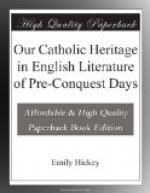At Whitby you may see the ruins of what must have been a very beautiful monastery, built high on a hill, swept by brisk and health-giving winds with the strength and freshness of moorland and sea. This monastery, part of which was for monks, and part for nuns, was ruled by Abbess Hild.[A] This seems strange to us, but it was because the Celtic usage prevailed in the government of the Abbey.
[Footnote A: Hilda is the Latinised form, which it is a pity to use instead of the English one.]
We must never forget the work of the Celtic missionaries who brought Christianity from the Western Islands to the North of England: and, of course, their “ways” as well as their message were impressed on the converts. Later on, as we know, the Roman usage was established all over the country.
Among the monks of Streoneshalh, as Whitby was then called, the Danes having given it its present name, there was, as St Bede the Venerable tells us, “a brother specially renowned and honoured by Divine grace, because it was his wont to make fitting songs appertaining to piety and virtue; so that whatever he learned from scholars about the Divine Writings, that did he, in a short time, with the greatest sweetness and fervour, adorn with the language of poetry, and bring forth in the English speech. And because of his poems the hearts of many men were brought to despise the world, and were inspired with desire for the fellowship of the heavenly life.... He was a layman until he was far advanced in years, and he had never learnt any songs. It was then the custom that, when there was a feast on some occasion of rejoicing, all present should sing to the harp in turn. And when Caedmon saw the harp coming near him, he would get up, feeling ashamed, and go home to his house. Now once upon a time he had done this and had left the house where they were feasting, and gone to the stall where the cattle were, which it was his duty that night to attend to. There, when his work was done, he lay down and slept, and in a dream he saw a man standing by him, who hailed him and greeted him and called him by his name, saying: ‘Caedmon, sing me something.’ And Caedmon answered and said, ’I can sing nothing, and therefore did I go from this feast, and depart hither, because I could not.’ And again he that was speaking with him, said: ‘Nevertheless, thou must sing for me.’”
Then Caedmon understood, and he said in the same spirit that prompted Our Lady’s “Be it done unto me according to thy word,” “What shall I sing?” And the guest of his dream said, “Sing the Creation for me.”
As soon as Caedmon had received this answer, he at once began to sing to the praise of God the Creator verses and words which he had never heard. St Bede quotes a few lines in the Northern dialect, which may be rendered thus:
“Now shall we praise the Guardian of the Kingdom of Heaven, the might of the Creator and the thought of His mind, the works of the Father of glory; how He made the beginning of all wonders, the everlasting Lord. First did He shape for the children of men Heaven for a roof, the holy Shaper. Then the mid-world the Guardian of Mankind, the Eternal Lord, the King Almighty, created thereafter, the earth for men.”




